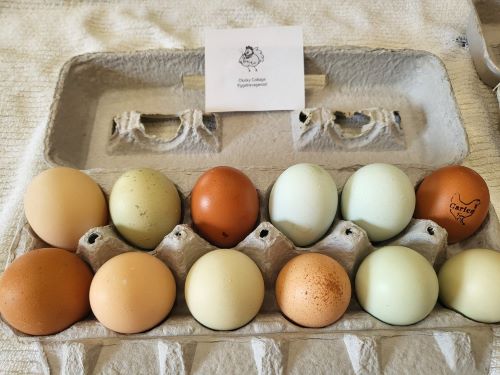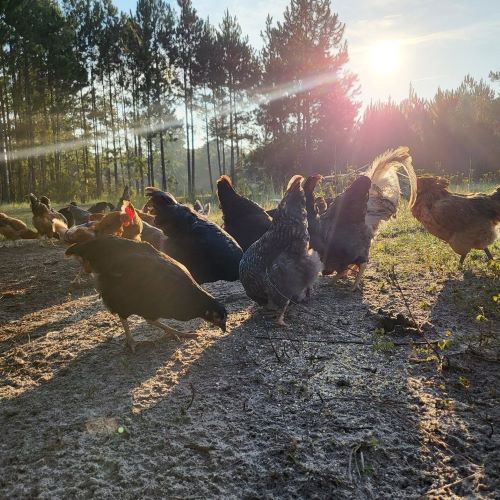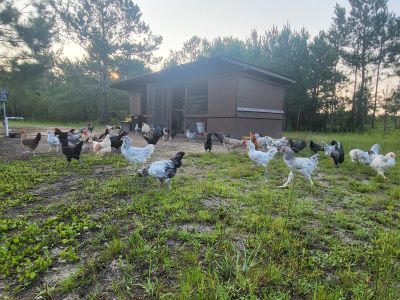Egg Label Guide: The Truth Behind Free-Range Egg Labels And Making Informed Choices
Consumer education on egg labels is of utmost importance in today’s world, where there is a growing interest in sustainable farming practices and animal welfare. As more people become conscious of the impact their choices have on the environment and the well-being of animals, it is crucial to understand the meaning behind different egg labels.
When you walk down the egg aisle at your local grocery store, you may come across various labels such as free-range, cage-free, organic, and more. Each label signifies a different method of egg production, and it is essential to decipher their meanings to make informed choices as a consumer.
Throughout this article, we will delve into the specifics of the free-range egg label, exploring its definition, regulations, and benefits for both chickens and consumers. But before we dive into the world of free-range eggs, let’s briefly touch upon the other common egg labels you may encounter.
Overview of Different Egg Labels
1. Cage-Free: Cage-free eggs come from hens that are not confined to cages. Instead, they are typically housed in large barns or warehouses where they have more space to move around. While cage-free systems offer more freedom of movement compared to traditional battery cages, the hens may still not have access to the outdoors.
2. Organic: Organic eggs are produced by hens that are fed an organic diet, free from pesticides, antibiotics, and genetically modified organisms (GMOs). These hens are also raised in accordance with specific organic farming standards, which include access to the outdoors.
3. Pasture-Raised: Pasture-raised eggs come from hens that have ample access to outdoor pasture areas. They spend a significant portion of their time foraging on grass and insects, which contributes to their overall well-being and the nutritional quality of the eggs.
Now that we have a basic understanding of the different egg labels, let’s focus on the free-range egg label and explore what it truly means for both the chickens and the consumers.
What is a Free-Range Egg?
Free-range eggs are a popular choice among consumers who prioritize animal welfare and sustainable farming practices. Understanding what constitutes a free-range egg is essential for making informed choices as a consumer.
Definition of Free-Range Eggs
Free-range eggs come from chickens that have access to the outdoors, allowing them to roam and forage in a natural environment. These chickens are not confined to cages and have the freedom to engage in their natural behaviors, such as dust bathing, perching, and socializing with other chickens.
Regulations and Standards for Free-Range Egg Production
In order for eggs to be labeled as free-range, there are specific regulations and standards that farmers must adhere to. These standards may vary slightly depending on the country or region, but they generally require that the chickens have access to an outdoor area for a certain number of hours per day.
For example, in the United States, the USDA (United States Department of Agriculture) defines free-range eggs as those produced by hens that have continuous access to the outdoors during their laying cycle. The outdoor area must have vegetation and be at least partially covered to provide shade and protection from predators.
Benefits of Free-Range Eggs for Chickens and Consumers
Free-range egg production offers several benefits, both for the chickens and the consumers:
- Improved Animal Welfare: Free-range chickens have the opportunity to engage in natural behaviors, leading to better overall welfare and reduced stress levels.
- Enhanced Nutritional Profile: Studies have shown that free-range eggs tend to have higher levels of omega-3 fatty acids, vitamin E, and beta-carotene compared to eggs from chickens raised in confinement.
- Environmental Sustainability: Free-range egg production promotes sustainable farming practices by allowing chickens to forage on pasture, reducing the need for artificial feed and minimizing the environmental impact.
- Supporting Local Farmers: Choosing free-range eggs supports local farmers who prioritize animal welfare and sustainable farming methods, contributing to the local economy and fostering a sense of community.
The Difference Between Free-Range and Cage-Free Eggs
When it comes to egg production, there are various labels that can be confusing for consumers. Two commonly used terms are free-range and cage-free. Understanding the difference between these labels is essential for making informed choices as a consumer.
Explanation of Cage-Free Eggs
Cage-free eggs refer to eggs that come from hens that are not confined to cages. Instead, these hens are allowed to roam freely within a barn or enclosed area. While they are not confined to individual cages, they may still be housed in large groups.
Comparison of Free-Range and Cage-Free Egg Production Methods
Free-range egg production goes a step further than cage-free. In addition to not being confined to cages, free-range hens have access to outdoor areas where they can roam, forage, and engage in natural behaviors. These outdoor areas are typically spacious and provide access to vegetation, insects, and sunlight.
On the other hand, cage-free hens are typically confined to indoor spaces, although they may have more room to move around compared to caged hens. They do not have access to outdoor areas.
Considerations for Animal Welfare and Consumer Choice
When it comes to animal welfare, free-range egg production is generally considered to be more humane compared to cage-free. Free-range hens have the opportunity to engage in natural behaviors, such as dust bathing, perching, and socializing with other chickens. They also have the freedom to move around and explore their surroundings.
While cage-free systems provide more space for hens compared to traditional caged systems, they still lack the ability to exhibit natural behaviors and access outdoor areas. It’s important for consumers to consider the welfare of the animals when making their purchasing decisions.
Consumer choice also plays a role in the decision between free-range and cage-free eggs. Some individuals prioritize supporting farming practices that align with their values, such as sustainability and animal welfare. By choosing free-range eggs, consumers can actively contribute to the demand for more humane and sustainable farming methods.
Understanding the Certification Process
When it comes to free-range eggs, understanding the certification process is crucial in ensuring transparency and accountability in the industry. Certification bodies play a vital role in verifying that eggs labeled as free-range meet specific criteria and requirements.
Overview of Certification Bodies for Free-Range Eggs
Several reputable certification bodies exist to regulate and certify free-range egg production. These organizations set standards and guidelines that farmers must adhere to in order to obtain certification. Some well-known certification bodies include:
- Animal Welfare Approved (AWA): AWA is a leading certification program that focuses on animal welfare standards. They ensure that free-range chickens have access to outdoor areas and are provided with proper care and living conditions.
- USDA Organic: The USDA Organic certification guarantees that free-range eggs come from chickens raised on organic feed and have access to the outdoors. This certification also ensures that no antibiotics or hormones are used in the production process.
- Global Animal Partnership (GAP): GAP is a comprehensive certification program that rates animal welfare practices on a scale from 1 to 5+. Higher ratings indicate better living conditions for the chickens, including access to pasture and enriched environments.
Criteria and Requirements for Obtaining Free-Range Certification
Each certification body has its own set of criteria and requirements that farmers must meet to obtain free-range certification. These criteria typically include:
- Providing chickens with access to outdoor areas where they can roam, forage, and engage in natural behaviors.
- Ensuring adequate space per chicken to prevent overcrowding and promote their well-being.
- Using sustainable and ethical farming practices, such as organic feed and avoiding the use of antibiotics or hormones.
- Maintaining proper hygiene and cleanliness in the chicken housing areas.
- Implementing measures to protect the chickens from predators and adverse weather conditions.
Importance of Third-Party Verification for Transparency
Third-party verification is a crucial aspect of the certification process for free-range eggs. It ensures that the certification bodies are independent and unbiased, providing consumers with confidence in the labeling claims. Third-party verification involves regular inspections and audits conducted by trained professionals who assess the farm’s compliance with the certification standards.
By having an independent entity verify the adherence to free-range standards, consumers can trust that the eggs they purchase truly come from chickens raised in free-range environments. This transparency fosters accountability and encourages farmers to maintain high standards of animal welfare and sustainable practices.
Debunking Common Misconceptions
When it comes to free-range egg production, there are several misconceptions that need to be addressed. By clarifying these misconceptions, we can provide accurate information to empower consumers and help them make informed choices.
Addressing Misconceptions about Free-Range Egg Production
One common misconception is that free-range chickens are constantly roaming in vast open spaces. While it is true that free-range chickens have access to outdoor areas, the term free-range does not necessarily mean they are always outside. Free-range chickens are given the freedom to roam and forage outdoors, but they also have access to sheltered areas for protection from extreme weather conditions or predators.
Another misconception is that free-range eggs are not as safe or clean as eggs from caged chickens. In reality, free-range egg producers follow strict regulations and standards to ensure the safety and cleanliness of their eggs. These producers implement proper hygiene practices, regular inspections, and quality control measures to maintain high standards of egg production.
Clarifying Misconceptions Surrounding Animal Welfare and Sustainability
Some people believe that free-range egg production is not necessarily better for animal welfare compared to other production methods. However, free-range systems prioritize the well-being of chickens by providing them with the opportunity to engage in natural behaviors, such as scratching, dust bathing, and socializing. This enriches their lives and promotes their overall health and happiness.
Additionally, there is a misconception that free-range egg production is not sustainable due to the land required for outdoor access. While it is true that free-range systems require more space, sustainable farming practices can be implemented to minimize environmental impact. Proper land management, rotational grazing, and utilizing natural resources effectively can help maintain a balance between sustainable farming and free-range egg production.
Providing Accurate Information to Empower Consumers
It is crucial for consumers to have access to accurate information about free-range egg production. By debunking misconceptions and providing transparent details about the practices followed by free-range egg producers, consumers can make informed choices that align with their values and preferences.
When purchasing eggs, consumers should look for certifications from reputable third-party organizations that verify the free-range claims. These certifications ensure that the eggs come from farms that meet specific standards for free-range production, animal welfare, and sustainability.
Tips for Making Informed Choices as a Consumer
When it comes to purchasing eggs, understanding the labels on the cartons can help you make conscious decisions that align with your values. Here are some tips to help you decipher egg labels and support local and sustainable farmers:
Look for Clear and Transparent Labeling
Choose eggs that have clear and transparent labeling, providing information about the farming practices used. Labels such as Certified Humane or Animal Welfare Approved indicate that the eggs come from farms that prioritize animal welfare.
Seek Out Local and Sustainable Farmers
Supporting local farmers not only helps the local economy but also reduces the carbon footprint associated with transportation. Look for eggs from nearby farms or consider visiting local farmers’ markets where you can directly interact with the farmers and learn about their practices.
Understand the Farming Practices
Take the time to research and understand the farming practices used by the egg producers. Look for terms like pasture-raised or free-range to ensure that the chickens have access to outdoor spaces and are not confined to cages. This allows the chickens to exhibit natural behaviors and leads to healthier eggs.
Consider Organic and Non-GMO Options
If you prioritize organic or non-GMO products, look for eggs that are certified organic or labeled as non-GMO. These labels indicate that the chickens were fed organic feed or feed that does not contain genetically modified organisms.
Support Ethical and Sustainable Practices
Choose eggs from farms that prioritize ethical and sustainable practices. This includes farms that use renewable energy sources, minimize chemical usage, and implement waste management systems. Look for certifications like Certified Organic or Certified Sustainable to ensure that the eggs come from farms committed to these practices.
Get Involved in Local Food Initiatives
Engage with local food initiatives and organizations that promote transparency and accountability in the egg industry. These groups often provide resources and information to help consumers make informed choices. By getting involved, you can contribute to the growth of sustainable farming practices in your community.
By following these tips, you can make conscious decisions as a consumer, supporting local and sustainable farmers while encouraging transparency and accountability in the egg industry.
Conclusion
Understanding egg labels is crucial for consumers who are interested in sustainable farming practices and animal welfare. By being informed about the different labels, consumers can make conscious choices that align with their values. This section will recap the importance of understanding egg labels, emphasize the significance of consumer education, and promote sustainable farming practices and animal welfare.
Recap of the Importance of Understanding Egg Labels
When it comes to purchasing eggs, understanding the labels is essential. Egg labels provide valuable information about how the chickens were raised and the conditions they were kept in. By knowing what each label means, consumers can support farming practices that prioritize animal welfare and sustainability.
Emphasizing the Significance of Consumer Education
Consumer education plays a vital role in driving positive change in the egg industry. By educating themselves about the different labels and production methods, consumers can make informed choices that align with their values. It is important to stay updated on the latest information and research regarding egg production to make conscious decisions.
Promoting Sustainable Farming Practices and Animal Welfare
Supporting sustainable farming practices and animal welfare should be a priority for consumers. By choosing free-range eggs, consumers are supporting farmers who prioritize providing chickens with access to outdoor spaces where they can engage in natural behaviors. This not only benefits the chickens but also contributes to the overall health and quality of the eggs.
Additionally, consumers can further promote sustainable farming practices by supporting local farmers who prioritize ethical and environmentally friendly practices. By purchasing eggs from these farmers, consumers are directly contributing to the growth of sustainable agriculture and the well-being of animals.
It is important to remember that consumer choices have the power to drive change. By demanding transparency and accountability from the egg industry, consumers can encourage farmers to adopt more sustainable and humane practices. Together, we can create a better future for both animals and the environment.
Related FAQ
What are free-range eggs, and how are they different from other types of eggs?
Free-range eggs come from chickens that have access to the outdoors, allowing them to roam, forage, and engage in natural behaviors. This is different from cage-free eggs, where hens are not confined to cages but may not have outdoor access, and conventional eggs from hens are kept in small cages.
Are free-range eggs more nutritious than conventional eggs?
Yes, studies have shown that free-range eggs tend to have higher levels of beneficial nutrients, such as omega-3 fatty acids, vitamin E, and beta-carotene. The outdoor foraging and natural diet of free-range chickens contribute to the enhanced nutritional profile of their eggs.
How do free-range eggs promote animal welfare?
Free-range egg production allows chickens to express natural behaviors and move freely, leading to improved animal welfare. They can scratch, take dust bathes, perch, and socialize, which reduces stress and promotes their well-being.
Does free-range egg production have a positive impact on the environment?
Yes, free-range egg production can be more environmentally sustainable compared to conventional methods. By allowing chickens to forage on pasture, it reduces the need for artificial feed, minimizing the environmental footprint of egg production.
How can I support sustainable farming and make ethical choices as a consumer?
To support sustainable farming and animal welfare, opt for free-range or pasture-raised eggs labeled with reputable certifications. Choose eggs from local farmers who prioritize ethical and eco-friendly practices. Being a conscious consumer empowers you to contribute to a healthier and more sustainable food system.
Key Take Away
- Understand the Meaning Behind Egg Labels: Learn the distinctions between free-range, cage-free, organic, and other egg labels to make informed choices as a conscious consumer.
- Embrace Free-Range Eggs for Better Animal Welfare: Free-range egg production allows chickens to roam outdoors, engaging in natural behaviors and leading to improved animal welfare and reduced stress.
- Enjoy Nutrient-Rich Eggs: Opt for free-range eggs to access higher levels of beneficial nutrients, including omega-3 fatty acids, vitamin E, and beta-carotene.
- Support Sustainable Farming Practices: By choosing free-range eggs, consumers promote sustainable farming methods that have a positive impact on the environment and reduce the need for artificial feed.
- Empower Local Farmers and Foster Transparency: Support local farmers who prioritize ethical and sustainable practices, and look for reputable certifications to ensure transparency in egg production.
Glossary
- Free-Range: A term referring to eggs produced by chickens that have access to the outdoors, allowing them to roam and forage in a natural environment.
- Cage-Free: Eggs produced by hens that are not confined to cages but may still be housed in large barns or warehouses without outdoor access.
- Organic: Eggs produced by hens that are fed an organic diet free from pesticides, antibiotics, and GMOs, and raised in accordance with specific organic farming standards, often including outdoor access.
- Pasture-Raised: Eggs from hens that have ample access to outdoor pasture areas, where they can forage on grass and insects, contributing to their overall well-being and the nutritional quality of the eggs.
- Animal Welfare: The ethical and humane treatment of animals, ensuring their physical and psychological well-being and protecting them from unnecessary suffering or harm.
- Sustainability: A farming practice that focuses on producing food in a way that is environmentally responsible, economically viable, and socially beneficial, without depleting natural resources or harming the ecosystem.
- Certification Bodies: Organizations that regulate and certify free-range egg production, setting standards and guidelines that farmers must adhere to for obtaining certification.
- USDA Organic: The certification from the United States Department of Agriculture (USDA) that guarantees eggs come from chickens raised on organic feed and with access to the outdoors, with no use of antibiotics or hormones.
- Global Animal Partnership (GAP): A comprehensive certification program that rates animal welfare practices, providing ratings from 1 to 5+ based on living conditions and access to outdoor areas.
- Conscious Consumer: A consumer who makes informed and mindful choices about the products they purchase, considering factors such as sustainability, ethical practices, and the impact on the environment and animal welfare.



